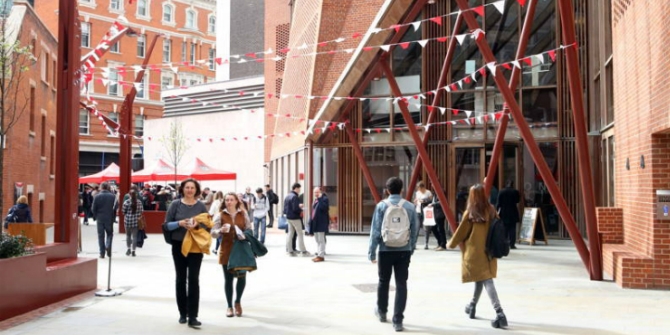In this piece, Sandeepan Tripathy recounts his journey to sociology: both the discipline and the Department of Sociology at LSE, exploring the thresholds he has passed along the way.
It would be sociologically inadmissible to say it was all “fate and luck” (well I share my date of birth with August Comte). Turning to Sociology was based on a desire to not pursue science after 12th grade in India for few reasons. I lost my desire and interest in discovering relations between ions and natural forces. A hobby of writing letters to editor to National Newspapers on socio-political issues became a full-fledged activity for me as the “India Against Corruption Movement” took place in 2011. The chaos and disturbance, which I encountered in my day-to-day interactions following this event, couldn’t be answered with the intellectual armory at my disposal. While corruption became an issue that the masses had taken up arms to against the state, I had taken up arms against social conventions and norms. Informal means of social control that encroach private spaces are still dominant in metropolitan cities. This was the first threshold I wanted to escape. I decided to change lanes from engineering to “Arts”.
“Arts” was used as an umbrella term, often derogatory, for social sciences, humanities and behavioral sciences. And Sociology to me was an alien term until I encountered it in a magazine that explained its importance in understanding “society”. Driven by fascination and curiosity, I skimmed through textbooks by “Haralambos”, “Giddens” and “JJ Macoinis” which amazed me by the way everyday interactions, groups and society as a whole were explained. They were in sync with the questions that disturbed me. Graduation from Ravenshaw University, Cuttack, became crucial in orienting me from a common sense understanding to “sociological” understanding. Sociology gradually became not simply a “subject” or a “discipline” but a means of making sense of the self, the others and the relation between both. During these three years, a trap door in the education system and social class became quite evident for me. Escaping the threshold of informal means of social control and engaging in creative activity, I felt, was a result of the bargaining power a class or a caste is endowed with because of its cultural capital.
I developed a productive relationship with my course conveners over the years to learn more and with required efforts found myself obtaining a seat in two top national universities for my masters in 2015; Tata Institute of Social Sciences, Mumbai and Central University of Hyderabad. I joined the former with Social Work. The jump from the poorest state in the country to the financial capital (Mumbai), of the largest democracy in the world (India), re-programmed my perception of society again. This threshold was about escaping regional institutional dynamics to a national one. But the changing political atmosphere created an antagonism in the student community especially in social sciences; consequently, I dropped out of the course and joined the Sociology department at the Central University of Hyderabad. The opportunity to delve deeper into sociology arose when I was selected as an exchange student into Heidelberg University for transcultural studies in 2016. This jump was larger in every sense and “identity” took a different term. Moving away from caste and class, I was now identified as a representative of my nation, my institute and an “immigrant”. But sociology helped me escape this threshold and “sociological imagination” helped me climb “empathy walls” as I encountered similar experiences of poverty, discrimination and inequalities outside of India. One of the primary effects of this whole process was the dilemma sociology put me into. To what extent can I be a sociologist at the cost of being an individual in the society?
What could be explained, as a sociologist, seemed implausible as an individual. What could be explained as social action, as a sociologist, seemed unethical as an individual.
The greatest challenge I arrived at was escaping the threshold of a sort of human subjectivity ridden with judgmental notions of entering into a niche of “social science”. I was concerned with how our mental states may be psychologically predisposed but socially guided, which motivated me study further. I obtained an offer for a masters programme at the Department of Sociology at LSE and accepted it instantaneously.
The LSE Sociology experience began before joining LSE as I encountered books like “Sociology of Speed” (edited by the Department’s Judy Wajcman and Nigel Dodd) and “Social Class in the 21st Century” (edited by the Department’s Mike Savage). My journey from Bhubaneswar to London involved different stages of transformation, from learning sociology as a student to thinking like a sociologist. It was quite therapeutic to hear during one of my Michaelmas Term lectures at LSE (for the first time since I began studying sociology) that “there is no right or wrong answer”. LSE has opened up mental faculties to think laterally and relate concepts across modules towards a dissertation idea. It has created a sense of comfort for me to critique long-standing conceptualizations and avoid the ‘worship’ culture that is often assigned to certain theorists in some education systems. “Identity” here for me remains currently twofold: an Indian and a sociologist. In this next threshold, I’m moving from a sociological fetishism to an interdisciplinary approach in understanding society. The lag I find between where I come from and where I am now is a larger process of complex contagion in society back home which may be from a dystopic imitation of a “western lifestyle” and “western thought”. This forms one of my key interests; in broader terms, coming up with solutions for certain social problems that are endemic in nature. From an epistemological standpoint, I feel that understanding social life through “coping strategies” might be relevant in opening new doors towards a sociology of emotions and a sociology of decisions. Quite fitting I guess, as I introspect “coping strategies” throughout my own journey.
Sandeepan Tripathy is an MSc Sociology student in the Department.





